2024-2025 IFP 招生資訊
2023-2024年國際專修部【1+4方案】華語課程先修
INTERNATIONAL FOUNDATION PROGRAM
| 中文 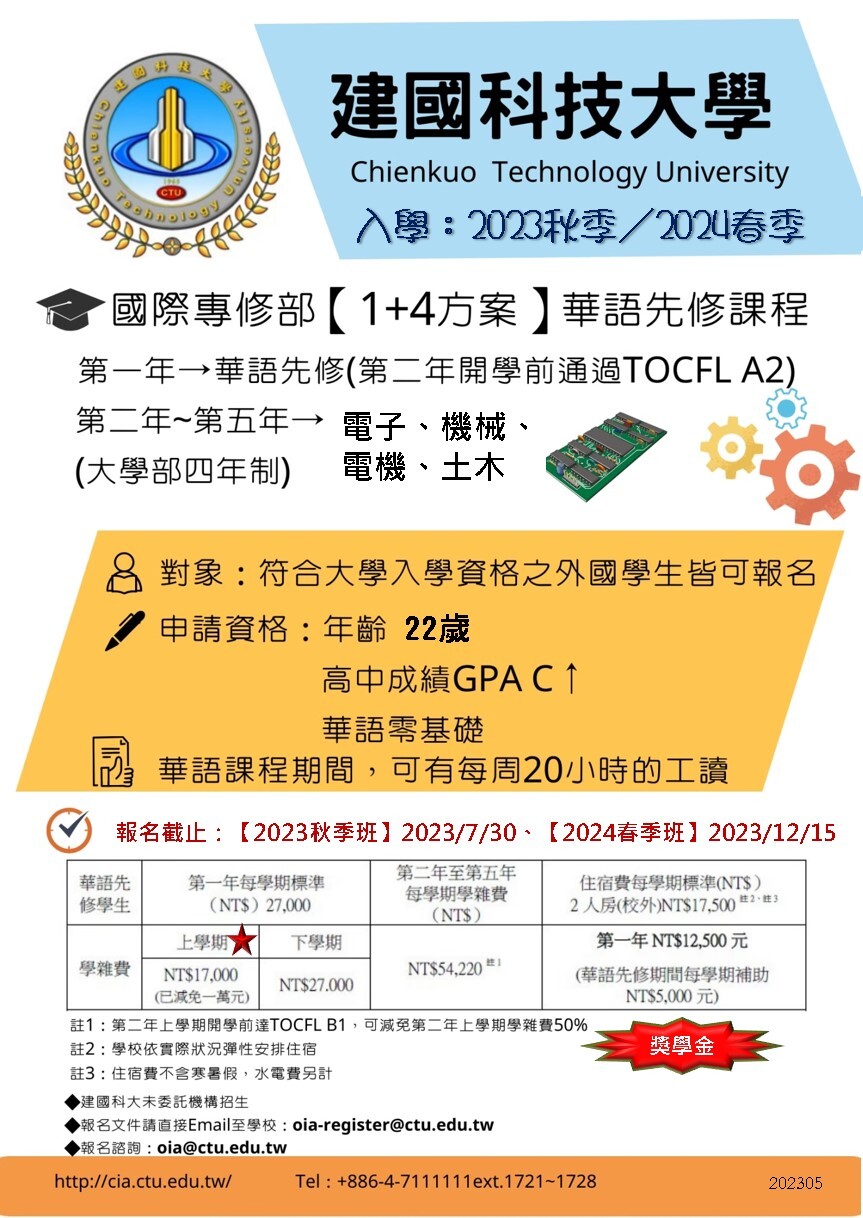 | 英文ENGLISH
| 英文ENGLISH 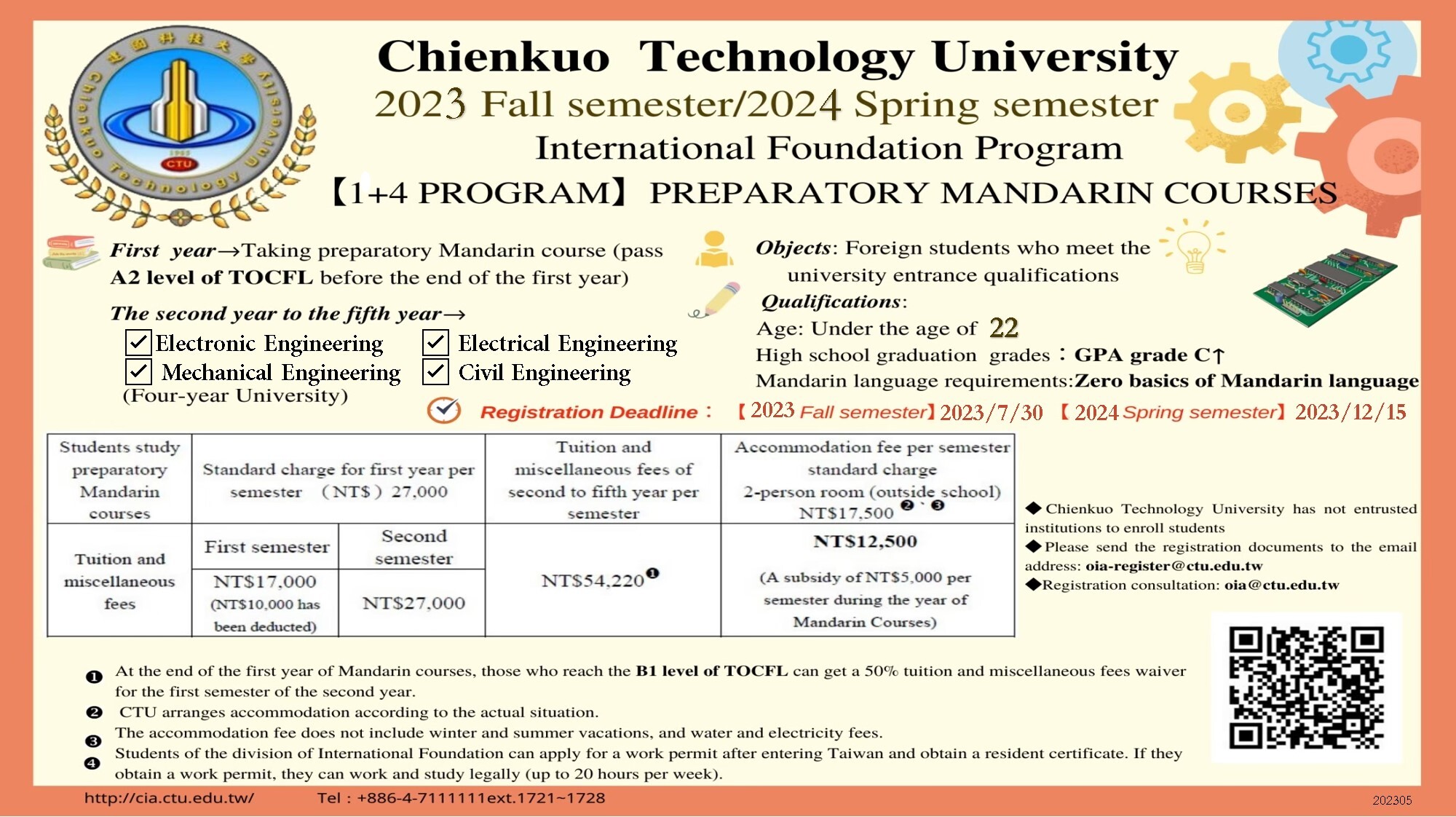 | 越南文Vietnamese
| 越南文Vietnamese 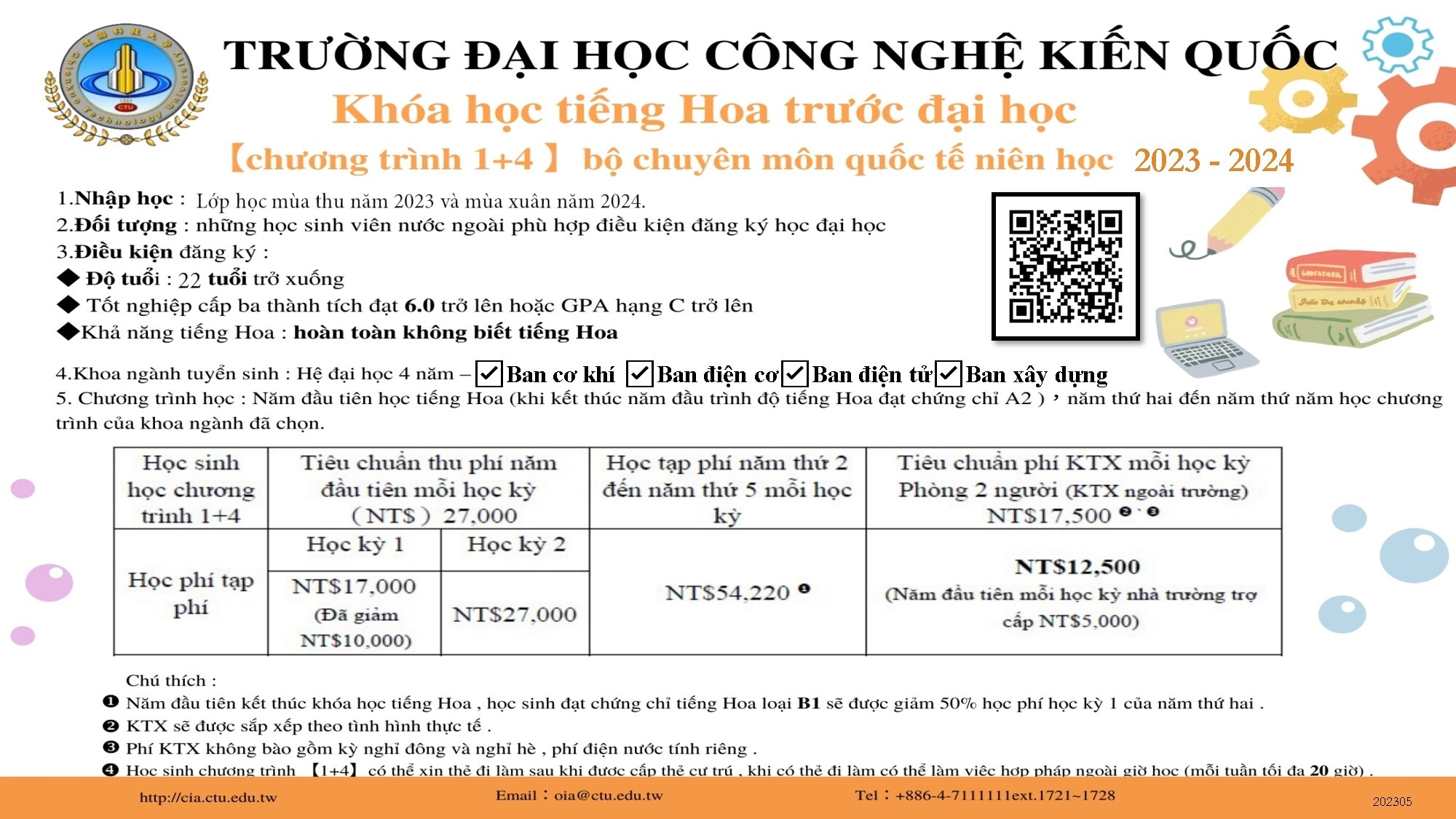 | 緬甸文Burmese
| 緬甸文Burmese 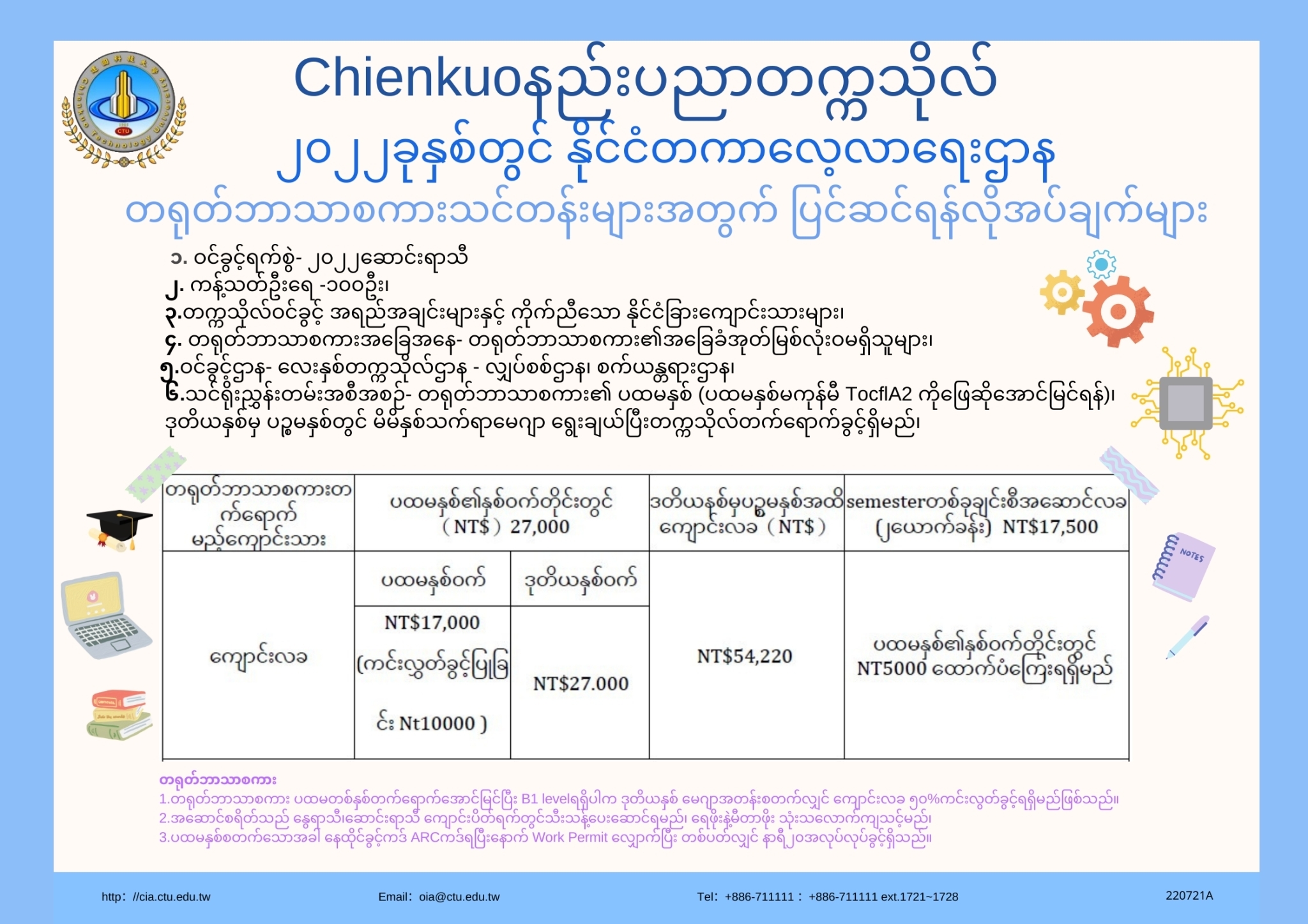 |
|
| 印尼文Indonesian ![]() | 蒙古Mongolian
| 蒙古Mongolian ![]() | 韓文Kroean
| 韓文Kroean 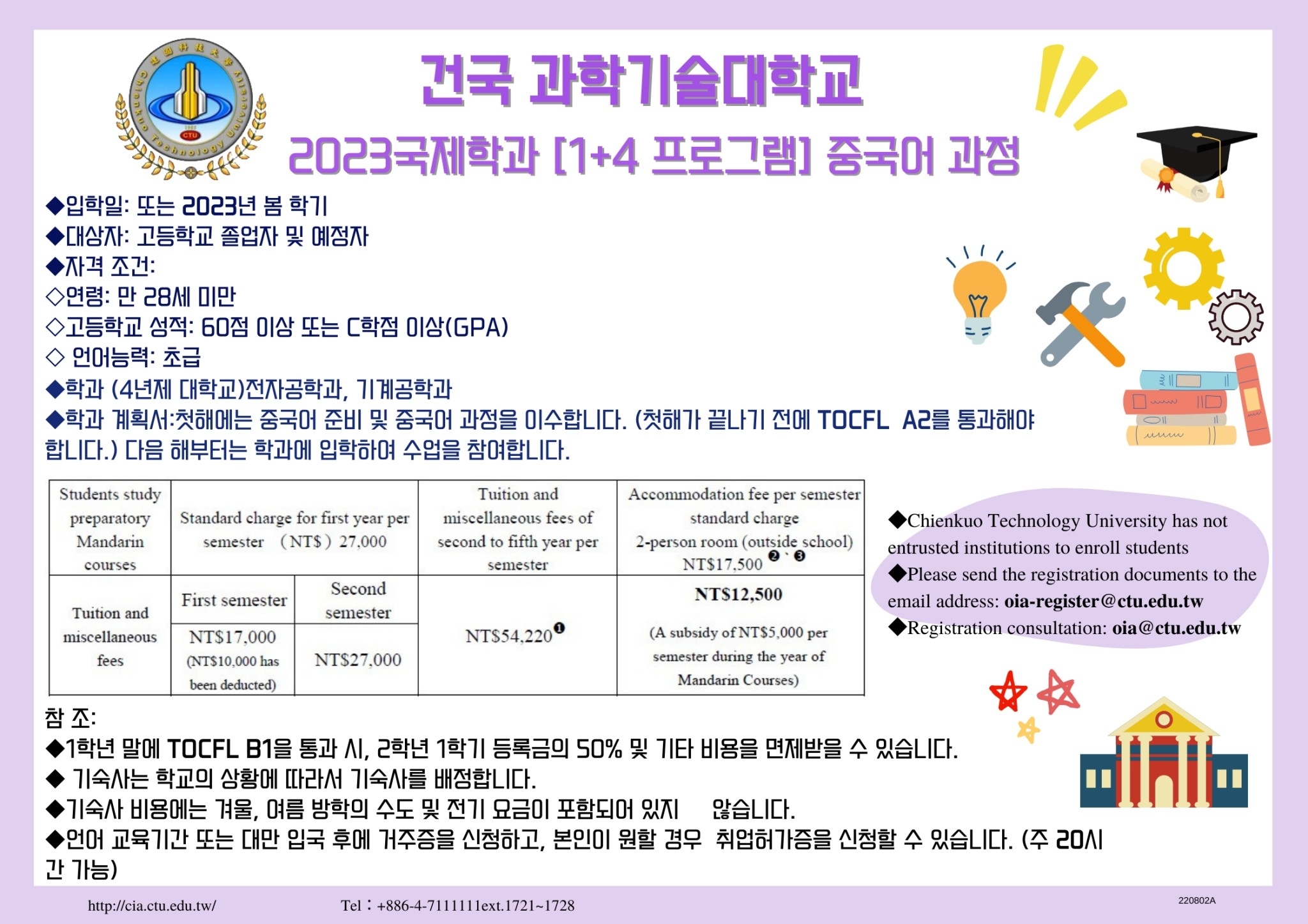 | 日文Japan |
| 日文Japan |
【招生資訊】國際專修部【1+4方案】華語課程先修(中英)
招生資訊
|
建國科技大學 Chienkuo Technology University 國際專修部【1+4方案】華語課程先修簡章 INTERNATIONAL FOUNDATION PROGRAM
Admission Date: Fall semester & Spring Semester
Qualifications:
Department of Admissions:
Taking preparatory Mandarin courses in the first year (pass A2 before the end of the first year), the second year to the fifth year: enter the key industrial department.
國際專修部1+4年學費收費標準 tuition fee standard charge of the "1+4 Years Program", International Foundation Program
聯絡email: oia-register@ctu.edu.tw / TEL: +886-47116392 / +886-47111111ext.1724~1727 |
||||||||||||||||||||||||||||||||||||||||||||||||||||||||||||||||||
 自2023年7月26日教育部核准新增招生觀光系【臺教技(四)字第1122302165K號】
自2023年7月26日教育部核准新增招生觀光系【臺教技(四)字第1122302165K號】
The Ministry of Education approved the new Department of Tourism in our 1+4 course enrollment department from autumn semester 2023
 0應繳資料-CTU國際專修部招生簡章.pdf
0應繳資料-CTU國際專修部招生簡章.pdf attachment1-CTU國際專修部學申請資料檢核表List of Application Required Materials
attachment1-CTU國際專修部學申請資料檢核表List of Application Required Materials
- Bản kiểm soát hồ sơ đăng ký chương trình 1+4 hệ chuyên tu quốc tế của trường Đại học công nghệ Kiến Quốc attachment2-CTU國際專修部入學申請表Application form for admission (含attachment 3- attachment 12)
attachment2-CTU國際專修部入學申請表Application form for admission (含attachment 3- attachment 12)
- Đơn xin nhập học
 attachment3-CTU在台就學身份切結書Checklist and Declaration for International Applicants Undertaking Studies in Taiwan
attachment3-CTU在台就學身份切結書Checklist and Declaration for International Applicants Undertaking Studies in Taiwan
- Bản kiểm soát hồ sơ và bản cam kết attachment4-CTU身份資格具結書Admission Application Affidavit
attachment4-CTU身份資格具結書Admission Application Affidavit
- Đơn cam kết thân phận attachment5-CTU文件驗證切結書Affidavit (of admissions documents to be verified
attachment5-CTU文件驗證切結書Affidavit (of admissions documents to be verified
- Đơn cam kết giấy tờ attachment6-CTU留學讀書計畫Study plan / Statement of Purpose
attachment6-CTU留學讀書計畫Study plan / Statement of Purpose
- Đơn kế hoạch học tập attachment7-CTU個人資料蒐集同意書Personal Data Collection Agreement
attachment7-CTU個人資料蒐集同意書Personal Data Collection Agreement
- Đơn đồng ý thụ quyền kiểm chứng dữ liệu cá nhân (Authorization) attachment8-CTU申請入學推薦信The Letters of Recommendation
attachment8-CTU申請入學推薦信The Letters of Recommendation
- Thư giới thiệu -2 bản ( 1 bản của giáo viên tiếng Hoa) attachment9-CTU資助者財力證明保證書 proof of financial ability
attachment9-CTU資助者財力證明保證書 proof of financial ability
- Chứng minh tài chính attachment10-CTU入學獎學金申請表.pdf
attachment10-CTU入學獎學金申請表.pdf attachment11-CTU新生住宿申請表.pdf
attachment11-CTU新生住宿申請表.pdf
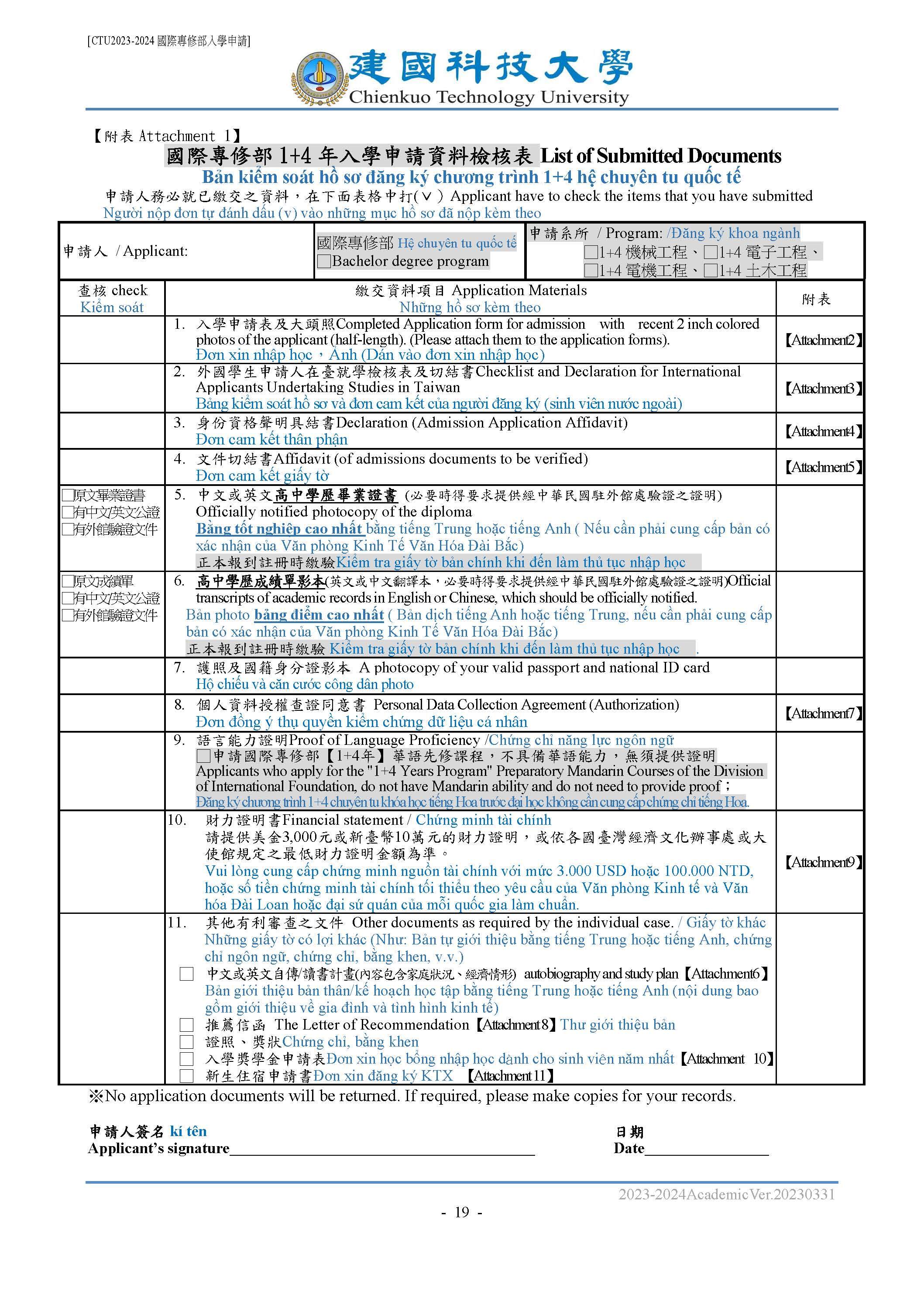
-
系所簡介
Department Introduction
- 電子系Department of Electronic Engineering
-
Engineering ethics and responsibilities
- 重視專業倫理與智慧財產權
- Value professional ethics and intellectual property rights
- 工程人員對國家社會之責任
- Responsibilities of engineers to society
-
Professional attitude and literacy
- 培養團隊合作與溝通協調能力
- Develop teamwork and communication skills
- 培養人際關係與危機處理能力
- Develop interpersonal and crisis management skills
- 工程倫理與責任
-
Implement creation and innovation
- 培養專題創作實作之能力
- Cultivate the ability of independent study creation and implementation
- 善用網際網路資源之能力
- The ability to make good use of Internet resources
- 專業態度與素養
-
Basic knowledge and ability
- 傳授工程基礎及應用必要知識
- To teach engineering fundamentals and application necessary knowledge
- 建立應用分析解決問題之能力
- Build the ability to apply analytics to solve problems
- 實作創造與創新
-
Instructional Objectives: Cultivate electrical machinery professionals with creativity, innovation, and entrepreneurship. The goals include basic knowledge and ability, practical creation and innovation, professional attitude and quality, engineering ethics, and responsibility.
-
- 基礎知識與能力
-
Department features: The development of this department aims to cultivate high-level technical R&D personnel in electrical engineering with both practice and theory and perform tasks related to design, production, construction, operation and maintenance, in order to assist the continuous upgrading of domestic industries. Strengthen the promotion of the characteristics of "green energy power technology", "semiconductor process technology and machine maintenance training", "embedded system maintenance integration", and develop teaching materials for the education and training of teachers and students in the whole school with the advent of the information age, and achieve the purpose of resource sharing.
- 教學目標 : 培育具創造力、創新力及創業力之電機專業人才,目標涵蓋:基礎知識與能力、實作創造與創新、專業態度與素養、工程倫理與責任。
- 系所特色 : 本系所發展以培養實務與理論兼備的電機工程高階技術研發人材,執行有關設計、製作、施工、運轉及維修等任務為目標,以協助國內產業持續升級。加強推展系所特色「綠色能源電力技術」、「半導體製程技術與機台維修訓練」、「嵌入式系統維修統合」,並隨著資訊化時代的來臨發展教材提供全校師生教育訓練之用,並達到資源共享之目的。
-
Cultivating talents with "six abilities" - able to do, think, learn, socialize, live, and work: the goal is to cultivate high-quality innovative technical talents.
- 電機系Department of Mechanical Engineering
-
Cultivating "Test System Manager" talents: The goal is to cultivate test system manager talents.
-
- 培育『六能』人才 ─能動手、能思考、能學習、能社交、能生活、能工作:以培育高素養創新型技術人才為目標。
-
Cultivating "Design System Managers" talents: The goal is to cultivate the talents of design system Managers.
-
- 培育『測試系統管理師』人才:以培育測試系統管理師人才為目標。
-
Cultivating "production system engineer" talents: The goal is to cultivate production system engineer talents.
-
- 培育『設計系統管理師』人才:以培育設計系統管理師人才為目標。
-
Cultivating "mechatronics integration" talents: The goal is to cultivate talents of mechatronics engineers.
-
- 培育『生產系統工程師』人才:以培育生產系統工程師人才為目標。
-
Cultivating "electronic control design" talents: The goal is to cultivate the talents of electronic control design engineers.
1.2 培育『自動化機構設計』人才 : 以培育自動化機構設計工程師人才為目標。
Cultivating "Automation mechanism design" talents: The goal is to cultivate the talents of automation mechanism design engineers.
-
- 培育『機電整合』人才 : 以培育機電整合工程師人才為目標。
-
Instructional Objectives:
-
- 培育『電控設計』人才 : 以培育電控設計工程師人才為目標。
-
Department features: Make great efforts to point out the advantages and disadvantages of the school's teaching, department of automation engineering has changed the traditional teaching methods are based on imparting established professional knowledge, and instead, focus on professional logical thinking and reverse inference, teaching students to treat science with a skeptical sight, facing problems with an attitude of challenging authority, closely follow the trend of science and technology, and cultivate the ability to think and judge independently. Our department has already achieved its expected goals in the recruitment of professional talents. In addition, the department has planned four major courses of robotics and intelligent control, optoelectronics and communication technology, nanotechnology and materials, and technology management for graduate students of the institute and related persons to choose. It is suitable for developing in-depth academics, exploring the wide application of related technologies in domestic industries, and achieving the goal of placing equal emphasis on theory and practice.
- 教學目標:
- 系所特色 : 本系所本著勵精圖治針砭本校教學利弊,特改變本校以往以傳授既定之專業知識為主軸的傳統授課方法,轉而著重於專業邏輯思考暨逆向推論,教導學生常以懷疑的眼光對待科學,以挑戰權威的態度面對問題,緊緊跟著科技的脈動,培養獨立思考判斷的能力。於專業人才的網羅上本系所已臻預期目標,另外本系所規劃出機器人與智慧型控制、光電與通訊科技、奈米科技與材料及科技管理學程四大學程,以供本所研究生及相關人士選修,適以發展深度學術,探討廣泛應用相關科技於本國產業,進而達到理論與實務並重的目的。
- 機械系Department of Electrical Engineering
-
1.4培養學生具備專業倫理、關懷社會之道德精神
Cultivate students with professional ethics and the moral spirit of caring for the society
- 培養具備敬業、負責的職業道德。
- Develop a professional and responsible work ethic.
- 求真求實、守法守分的工作態度。
- Truth-seeking, law-abiding work attitude.
- 合群互助、持久有恆的專業精神。
- Mutual assistance, lasting professionalism.
- 熱心助人、關懷社會之精神與熱情。
- The spirit and enthusiasm for helping others and caring for society.
-
1.3訓練學生實務專題創作及溝通與協調能力
To train students in practical project creation and communication and coordination skills
- 培養實務專題個別或集體創作之能力。
- Cultivate the ability of individual or collective creation of practical topics.
- 培養領導、團隊溝通與協調合作之能力。
- Develop leadership, team communication and coordination skills.
-
1.2奠定厚實之電子專業技術能力
Lay a solid electronic professional technical ability
- 培養各類電子設備或系統之專業技術。
- Cultivate professional skills in various electronic equipment or systems.
- 執行電子專業相關設計、製造、運用與修護等任務。
- Execute tasks related to electronic design, manufacture, operation, and maintenance.
- 使學生符合國內應用電子、資訊科技相關產業之人力需求。
- To enable students to meet the manpower needs of domestic applied electronics and IT-related industries.
-
Instructional Objectives:
1.1培養實務與理論兼備的優秀電子工程專業人才
Cultivating outstanding electronic engineering professionals with both practice and theory
- 培養電子工程專業實務知能。
- Cultivate practical knowledge of electronic engineering.
- 培養基礎數理及其應用之能力。
- Cultivate the ability of basic mathematics and application.
-
Department features: This department is characterized by the development of three major fields of information communication, microcomputer application, optoelectronics and semiconductors, which fully conforms to the development of the four major industries of the Central Taiwan Science Park: communications, computers and peripheral equipment, optoelectronics and integrated circuit industries. Through industry-academia cooperation, students can accumulate practical experience, connect with the industry in advance, and cultivate electronic professionals and technical personnel.
- 教學目標 :
- 系所特色 : 本系以資通訊、微電腦應用、光電與半導體三大領域為發展特色,完全符合中部科學園區四大產業:通信、電腦及週邊設備、光電與積體電路產業之發展。透過產學合作,提供學生累積實務經驗,提前與業界接軌,培養電子專業技術人才。
- 土木工程系
教學目標
本系依學術專業的發展特性及社會環境需求,配合學校和學院之中長期發展目標,擬訂本系所教育目標為教授一般土木營造與顧問公司等業界需求必備之基礎知識與技術,培養從事如規劃、設計、測繪、施工、檢驗等工作之人才。
- 培養具備國際觀與工程倫理之敬業精神
- 培養具土木工程技術與管理之實務技能
- 培養具營建與防災技術之特色素養
畢業出路
本系教學注重理論與實務之結合;除傳統土木知識外,更強調各項相關新科技及新觀念之介紹;本系同時與相關業界合作,輔導並鼓勵學生畢業前取得英檢、電腦軟體應用及測量專業證照外,並安排學生於四年級下學期赴業界以實習取代試用,從事各項土木相關領域工作之實習,增進學生對工程實務的了解,使學生畢業後能順利地開展其職場生涯。
- 營造工程師
- 品管工程師
- 內業工程師
- 測量工程師
Department of Civil Engineering, Chienkuo Technology University
Teaching objectives
According to the development characteristics of academic majors and the needs of the social environment, and in line with the medium and long-term development goals of schools and colleges, the department’s educational goals are formulated to teach the basic knowledge and essential skills for general civil engineering construction and consulting companies, to cultivate those engaged in such fields as talents in planning, design, surveying and mapping, construction, inspection, etc.
- Cultivating professionalism with international outlook and engineering ethics
- Cultivating practical skills in civil engineering technology and management
- Cultivating the characteristic literacy of construction and disaster prevention technology
Prospects after graduation
The teaching of this department pays attention to the combination of theory and practice; in addition to traditional civil engineering knowledge, it also emphasizes the introduction of various related new technologies and new concepts; the department also cooperates with relevant industries to guide and encourage students to obtain English certificate, computer software applications and surveying professional certificate before graduation. In addition, students are arranged to go to the industry in the second semester of the fourth grade to replace the trial with internships and engage in internships in various civil engineering-related fields, to enhance students' understanding of engineering practice and enable students to start their careers smoothly after graduation.
- Construction engineer
- Quality control engineer
- Office engineer
- Measurement engineer
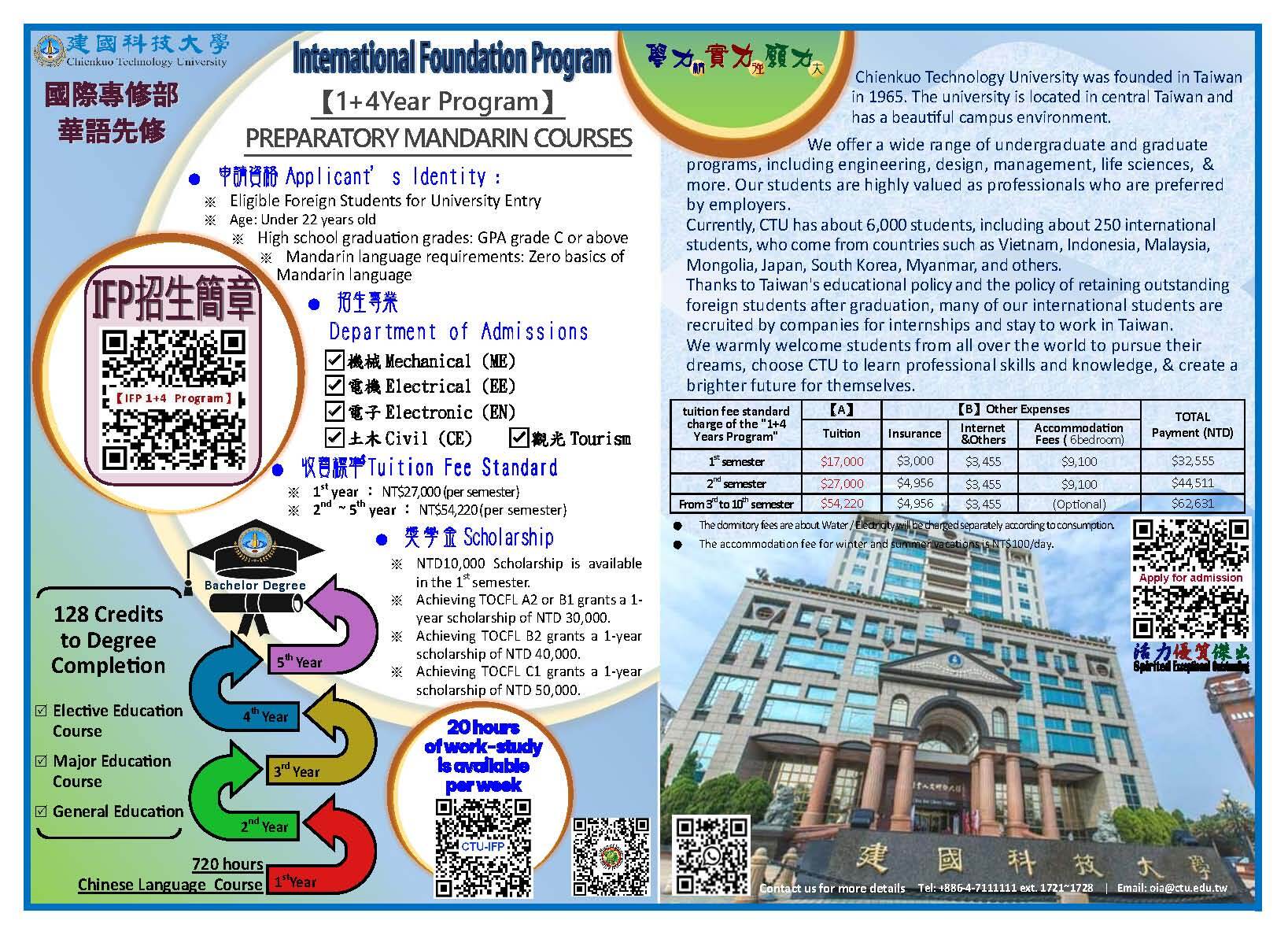
 leave messages
leave messages